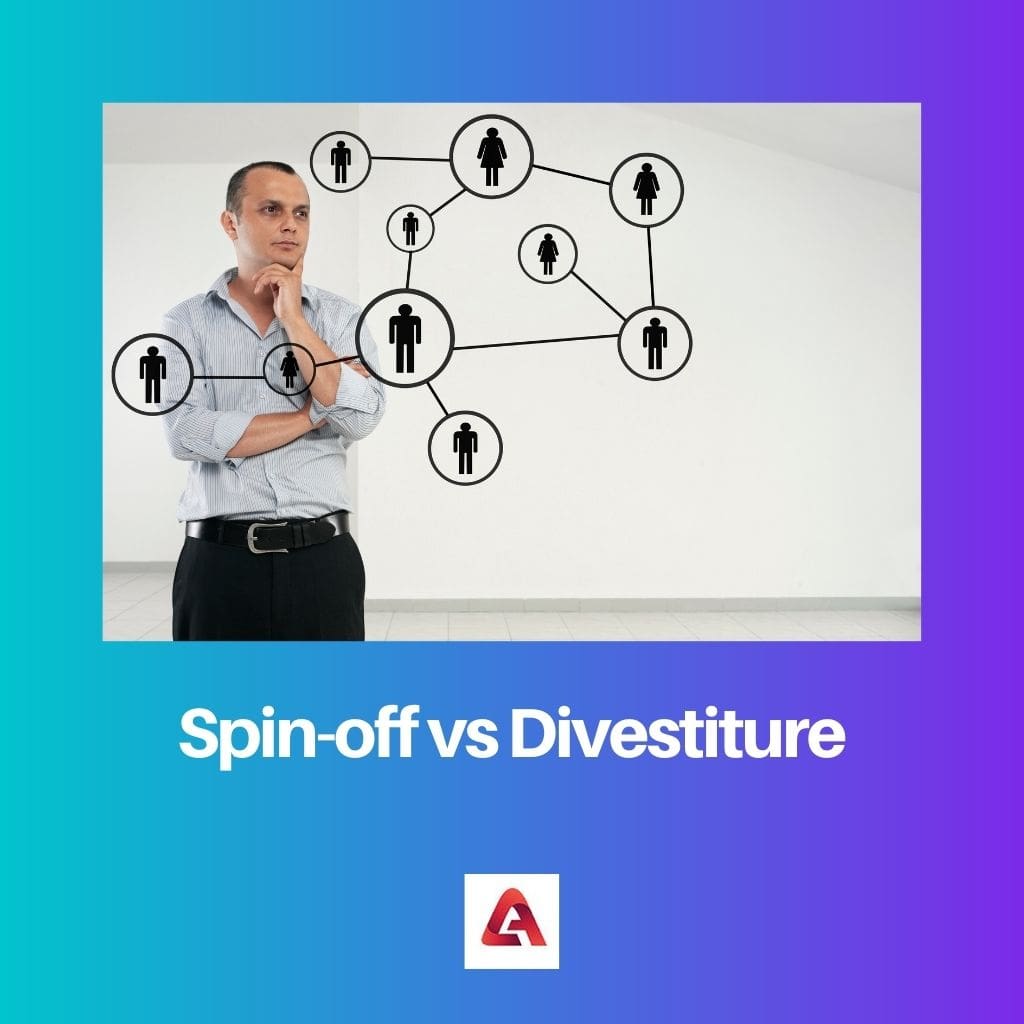It is an undeniable fact that companies may face some challenges in their business. The challenges could be related to cash, debts or making less profit.
Two such procedures are spin-off and divestiture. These terms sconfuse people due to their relevancy in distributing or selling assets.
Key Takeaways
- Corporate actions: Spin-off involves creating a separate, independent company from an existing business unit or subsidiary, while divestiture refers to the sale, transfer, or disposal of a company’s assets or business unit.
- Ownership: In a spin-off, shareholders receive shares of the new company proportional to their holdings in the parent company, while in a divestiture, the parent company may sell the business unit to another company or investors.
- Motivation: Spin-offs aim to unlock the potential value of a business unit and improve the focus of the parent company, while divestitures focus on raising capital, reducing debt, or divesting underperforming or non-core assets.
Spin-Off vs Divestiture
The difference between spin-off and divestiture is that spin-off reduces company shares to create an independent company.

Divestiture means getting rid of shares for various reasons. It may be to pay back debt, solve a money problem or create additional profit.
Comparison Table
| Parameter of Comparison | Spin off | Divestiture |
|---|---|---|
| Definition | Getting rid of shares of an existing company to make a new company. | I am getting rid of business assets for multiple reasons. |
| Objective | To focus on a particular sector of the parent company for more profit. | Pay debts, get cash, and focus on critical product lines. |
| Inheritance | Inherits the management structure and other assets of the parent company. | Once the assets are sold, the company has no say in how they are further used. |
| Drawbacks | The costs may increase because the parent company needs to deal with the spin-off too | The decision may be taken without expert advice, and the product may no longer exist for re-selling. |
| Example | eBay is establishing a result of PayPal. | Thomson Reuters distributes its property to minimize costs. |
What is Spin-Off?
Spin-off creates a new company by distributing and selling some of its shares. This new independent unit will have its own rules and management.
There could be various reasons for spin-offs. The company may want to work on the most profitable unit of its company and make it a separate division.
So the company may do so by a spin-off. Certain drawbacks accompany the spin-off procedure. Since the product will also generate costs like rent, tax, and maintenance, the parent corporation must handle that too.
When the spinoff can finally stand, it may need a proper operational, marketing, and management unit. So it requires long-term support from the parent company.

What is Divestiture?
Divestiture is a process that businesses use to dispose of some of their assets. There are various reasons for that. This happens when the companies focus on many different product lines, and it is getting harder for them to manage.
Some product lines are not making enough money, and their product lines are underperforming. Sometimes, businesses are in debt and must overcome the cash flow problem.
Sometimes, the same business opens its branches in several locations, and not every component may be making a profit for you.
You can have a look at your assets and try to divest those which would be able to make more cash for you. You can analyze your product lifecycle. The best time to end your product line would be when it has reached its decline stage.

Main Differences Between Spin-Off and Divestiture
Some of the features that differentiate between spin-off and divestiture are given below:
- The drawback of the spin-off is that the company costs may rise because the parent company needs to take care of the spin, too, initially. In contrast, the drawback of divestiture is that the agreement may be made in a hurry, and the product may be permanently gone.
- An example of a spin-off includes eBay creating a spin-off of PayPal. An example of divestiture includes Thomson Reuters selling its property to reduce costs.
- https://www.sciencedirect.com/science/article/pii/0304405X83900429
- https://academic.oup.com/rfs/article-abstract/20/3/557/1563919

The article does justice to the complex subject matter by offering a well-structured and informative piece
Absolutely, the technicalities are explained in a manner that makes it accessible to a wider audience
I agree, the article succeeds in presenting the content in an engaging and informative way
I found the article to be quite insightful. The breakdown of the objective and inheritance aspects of these procedures is particularly helpful in understanding their implications
Yes, the clarity in discussing the main differences between spin-off and divestiture is commendable
Agreed, the article does a great job of highlighting the motivations behind each procedure
This article provides a detailed overview, backed by references. It’s a great read for individuals seeking clarity on the topic
I agree, the references add credibility to the information presented, making it a reliable source of knowledge
The distinctions drawn between spin-off and divestiture are clearly articulated in this piece, serving as an effective resource for understanding these corporate actions
Yes, the article breaks down the fundamental differences with great clarity
Absolutely, the article is an excellent guide for anyone looking to gain insights into spin-off and divestiture
The detailed comparison provided in the article makes it an enriching read for those interested in understanding the nuances of corporate actions
The article provides a well-structured and informative piece, offering clarity on a complex topic
I agree, the article serves as a valuable resource for anyone seeking comprehensive knowledge on the topic
This article is very informative, I appreciate the clear comparisons and examples given
Yes, it’s a well-written piece covering important aspects of spin-off and divestiture
Absolutely, the in-depth explanation makes it easy to grasp the key differences
The informative content of the article is beneficial for those seeking in-depth knowledge about spin-off and divestiture
Absolutely, the article’s detailed analysis is valuable for understanding the nuances of these procedures
There is a comprehensive comparison presented in the article, which serves as a valuable resource for those looking to understand these corporate actions
Absolutely, the article offers an insightful analysis of two crucial business processes
Interesting article. It is important to note that identifying the differences between these business procedures can be crucial for some companies
I agree, the article provides a good explanation of both procedures
The article is a commendable elucidation of the differences between spin-off and divestiture, providing an insightful analysis
I agree, the article offers a comprehensive understanding of spin-off and divestiture
Absolutely, the article effectively explains the intricacies of these corporate actions